“Do you know your 17 times table?”
This is just one of the many unusual questions that makes going behind the scenes at Dundee’s Grosvenor Casino feel a bit like stepping into a slightly off-kilter universe.
Between the lack of windows which makes it seem like midnight and midday all at once, the old-timey uniforms and the demands of mental maths beyond my calculator-reliant capabilities, I’m completely out of my comfort zone.
But while it might seem an odd thing to ask, the 17 times table (in fact, all the times tables up to 35) is one of the many eclectic pieces of knowledge that are essential for those working the game tables at the gambling venue.
And for today, that’s me.
After exposing the darker side of a croupier’s life last year, I decided to put my money where my mouth is and see what value can be found in the job itself.
So I’m here to experience a taster of the casino’s Gaming Academy training programme – an intensive 200-hour course which takes new recruits from casino novices to qualified croupiers over five weeks.
“It’s quite an intense job, there’s a lot of learning,” explains Grosvenor Casino Dundee manager Ross Kiernan, who has been working in casinos since he left college 14 years ago.
“Being a dealer was my very first job back 2010, I had never even set foot in a casino,” he reveals. “Now here we are, and it’s a job you can do all over the world.”
Casino can provide skilled jobs to those with no experience
Ross explains that for many people looking for employment, casinos present a unique opportunity for an entry-level position which is also a skilled job.
“We do take people from Jobseekers, because everyone starts off inexperienced, so everyone goes through our training programme,” he says.
“It helps to be good at maths, but it’s really just a lot of pattern recognition and learning times tables. You can usually tell quite quickly if someone is going to enjoy it or not.”
Nodding along, I recall the mental arithmetic competition I won in primary five and try to channel some of my nine-year-old self’s skills into the task ahead.
Guided by Ross, plus newly qualified croupiers Jordon Brown and Dez Lindsay, I’ll spend the evening learning the basics of roulette and blackjack dealing.
But before all that, there are myths I need to bust.
No gangster glamour – just mental maths
The first is that behind the closed door of the separate poker room, there’s serious, big-money card games played by men in fedoras smoking cigars.
“No, that’s not the case,” smiles Ross. “Some casinos do have a private deal in, but our gaming tables are just our gaming tables.”
Disappointing. But ever-determined to preserve the glamour of this garish wonderland, I press on.
What, I demand, is the trick to the recruits’ buttery-smooth card shuffles and perfect spreads? Secret, special techniques? Scientifically slip-proof decks?
“Practice,” reveals Ross. “Lots and lots of practice. And the cards are 100% plastic, which makes them almost frictionless.”
As he prepared the blackjack table for our tutorial, I watch recent Gaming Academy graduate Jordon expertly shuffle and spread a deck of cards, checking that each diamond, heart, club and spade is present and correct.
“Three fingers scrunched up on the top, thumb and pinky either side and just glide,” Jordon coaches. Easy.
This is standard procedure before six decks are fed into an industrial shuffling machine, which constantly randomly shuffles cards, making illegal card-counting near impossible.
Full of entirely unfounded confidence, I ask to have a go at shuffling.
Imitating his hand movements, I split the deck, bend the cards towards one another to shuffle… and promptly send the lot spraying across the table.
Oops. This may be harder than it looks.
All work and no play makes a poor croupier
Deftly, Cupar native Jordon gathers up the cards and begins dealing a game of blackjack, during which he explains the different types of bets to me. But I’m confused – I thought we were training, not playing.
“We train by playing,” Jordon explains. “There were seven of us recruits, and we’d split into two groups – one of three, one of four.
“One person would take on the role of the dealer, and the others would play the customers. It’s the quickest way to make sure you understand the game.
“Essentially, we spent five weeks getting paid to play roulette and blackjack,” he jokes.
“And it’s fake money so it’s nice, you get that dopamine hit and adrenaline rush from when you get the winnings, if you take it seriously like me.
“My imagination goes a long way. I had imaginary winnings of about £1.1k at one point!”
From biochemistry to blackjack
For 26-year-old Dundee University graduate Jordon, the casino was an unexpected career path, but one he’s loving.
“I studied biochemistry,” he reveals. “I used to come here as a student and play blackjack, and I’d wonder what it would be like to be the one behind the table.
“After uni, I worked in a couple of warehouses, did some bartending, a wee bit of front of house and a wee bit of sales.
“This is much more technical and uses your brain much more. Warehouse work is a bit monotonous, you’re just going through the same motion every time, but here it’s great, it’s always changing.
“You always have different people coming to the tables and different sorts of bets. You can have conversations with people and make connections.”
Indeed, after my stint on the blackjack table, I can already see how much mental energy goes into this fast-paced job.
All the calculations are done silently in the croupier’s head, and there are meticulous procedures to follow when it comes to stacking chips for the cameras, and making payouts.
It’s blink-and-you-miss-it fast, although I’m assured that precision is valued ahead of speed.
“After the training it took me about a month or two just to be able to put it all together,” admits Jordon.
“It all has to be done in a very particular way, in plain sight of the camera and my inspector as well, in case I calculate incorrectly.”
‘If you’re a drummer, you’ll do well’
But if blackjack dealing is an extreme sport, roulette is more like an intricately choreographed dance, where the ball, wheel, ‘dolly’ (marker) and chips are moved in seamless rhythm by the croupier.
“If you’re a drummer, you’ll do well,” explains Jordon. “It’s about co-ordinating both sides of your body to do certain things, depending on if you’re on a left or right-handed table.”
Using a ‘left-handed’ wheel, much to Jordon’s dismay (“I can’t get as much flair with my left hand!”) I’m taught the steps.
My first spin of the ball – held between thumb and middle finger, and the flicked around the groove of the roulette wheel – goes better than anticipated, with the ball staying obediently inside the wheel.
“Often, it goes flying out the wheel and you’re chasing after it,” laughs manager Ross.
However, the ball needs to complete four loops of the wheel for the spin to be considered valid, and after about 10 failed attempts, I resolve that perhaps I’ve not found my new calling.
From there, the (pretend) bets are placed and called, and I clumsily – but correctly – calculate the payouts using the complex roulette grid system.
If like me you thought it was just a case of red or black, you’d be mistaken – there are at least eight different types of bets that can be made in roulette, and with five or six players per table on many occasions, I can see how the game quickly grows arms and legs for what needs to be a quick-witted croupier.
It’s here that the pattern recognition comes into play, with certain configurations of chips lending themselves to memorable amounts.
“See how this one here looks like Mickey Mouse?” Ross explains, pointing at three chips on the table.
“That’s always going to be a payout of £51. If you learn the patterns, it takes a lot of the mental arithmetic out of it.”
‘I’ve come far’ says former Rockwell pupil turned croupier
At this point, both my brain and my hands are cramping – a side effect which Jordon’s colleague and fellow Gaming Academy graduate Dez Lindsay says is normal after a shift.
“I was a mechanic before this, so I was used to working with my hands,” says 19-year-old Dundee man Dez. “But the hand cramps still get me! I much prefer it here though, it’s a really calm and friendly environment.”
For Dez, the opportunity to undergo croupier training has taken him far beyond the potential he saw in himself just a few short years ago.
“I started high school at Morgan Academy but I dropped out after second year and ended up going to Rockwell, which is an offsite educational facility.
“I’ve come far from where I was headed. I’m 100% going to pursue this as a career.”
‘You meet interesting characters’
As for me, I don’t think I’ll be quitting my day job or moonlighting as a croupier any time soon – my fingers are far too clumsy, and I’ve never been particularly adept at dancing or drumming.
But I am surprised (and a little alarmed) at how approachable the games are for total novices, and how willing the ‘house’ is to explain the rules to customers or demonstrate the game before expecting patrons to bet.
Indeed, Jordon and Dez both agree that making customers feel at ease and connecting with them is one of the most gratifying parts of their so-called “unsociable” occupation.
“You meet interesting characters, and new people every day,” says Dez.
“I’ve learned Cantonese numbers for one of the customers. Jordon’s learned Mandarin and some Japanese as well.
“It’s good to be able to interact with the customers more and make them feel comfortable being here.”
Always be Gamble Aware. Visit begambleaware.org to get informed about the risks of gambling or for support with gambling-related issues.
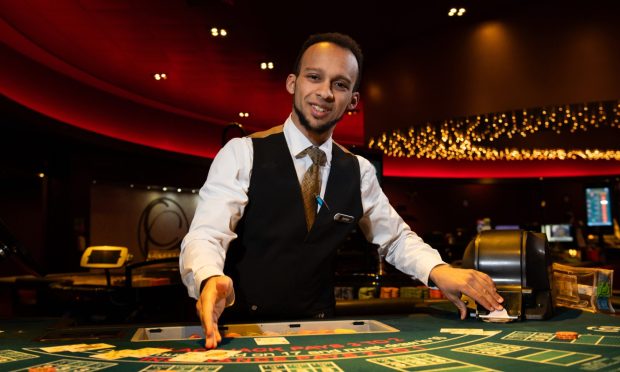
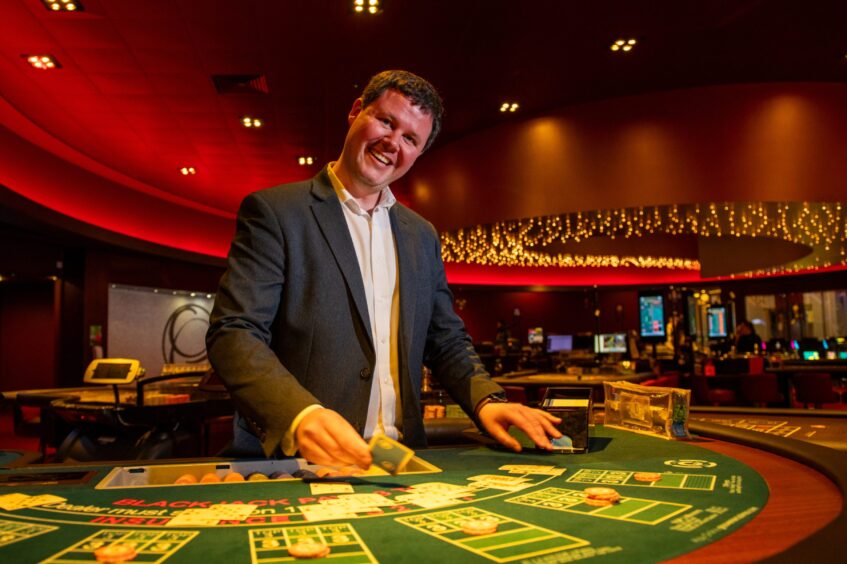
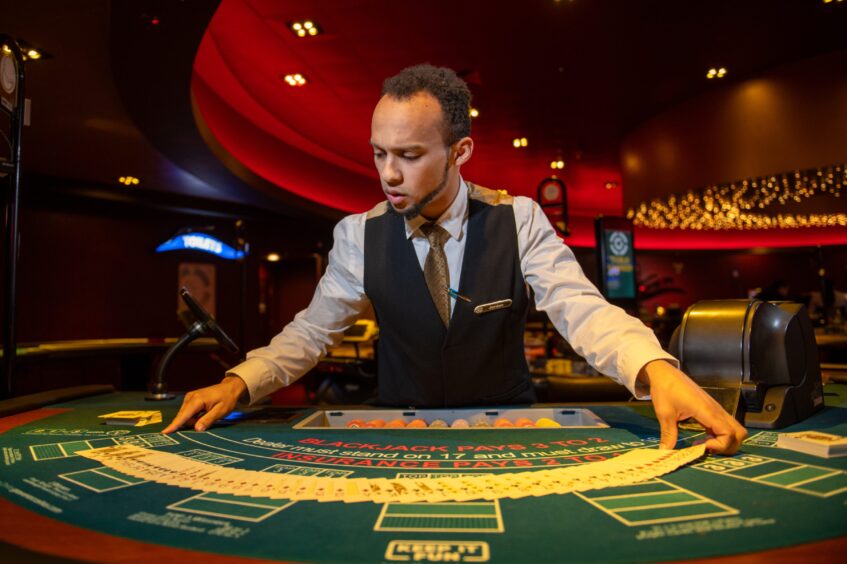
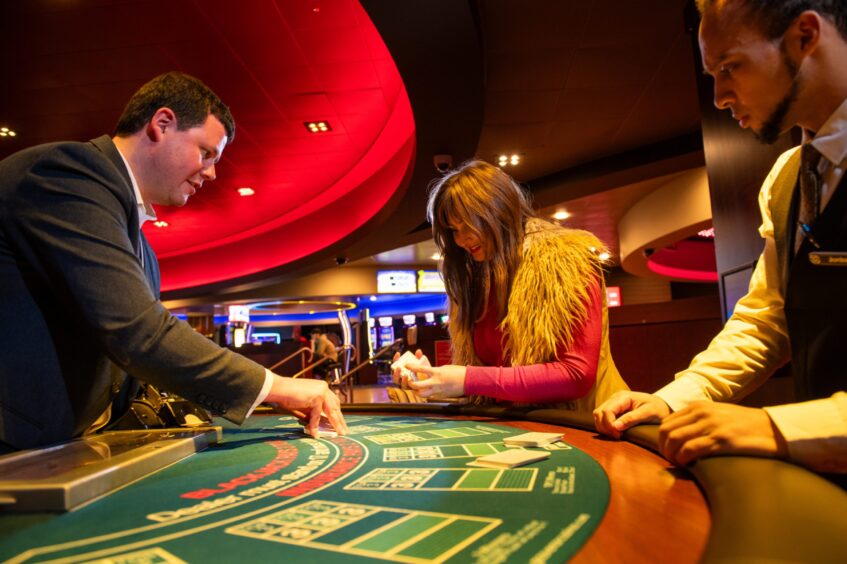
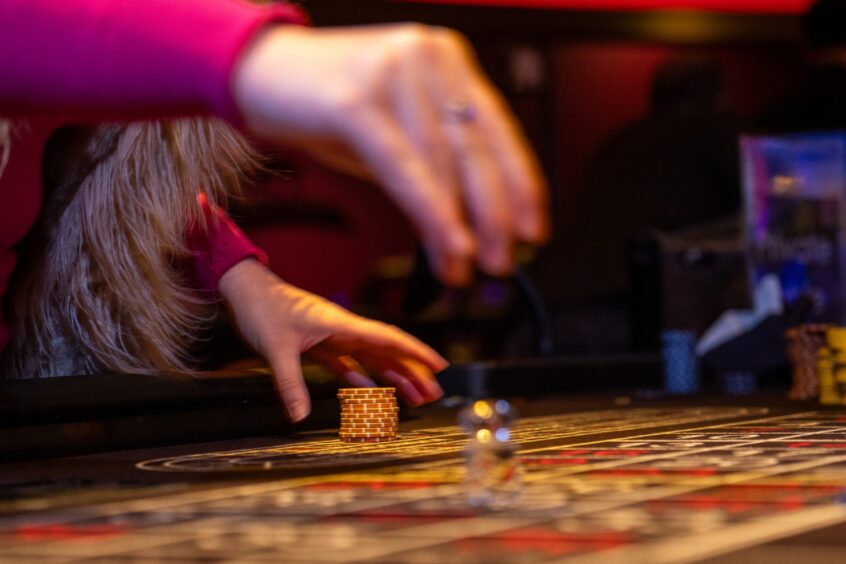

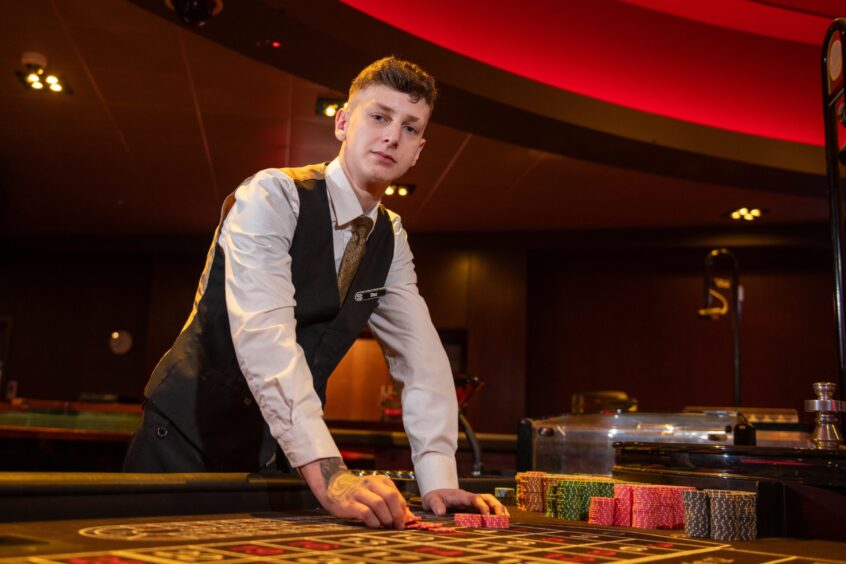
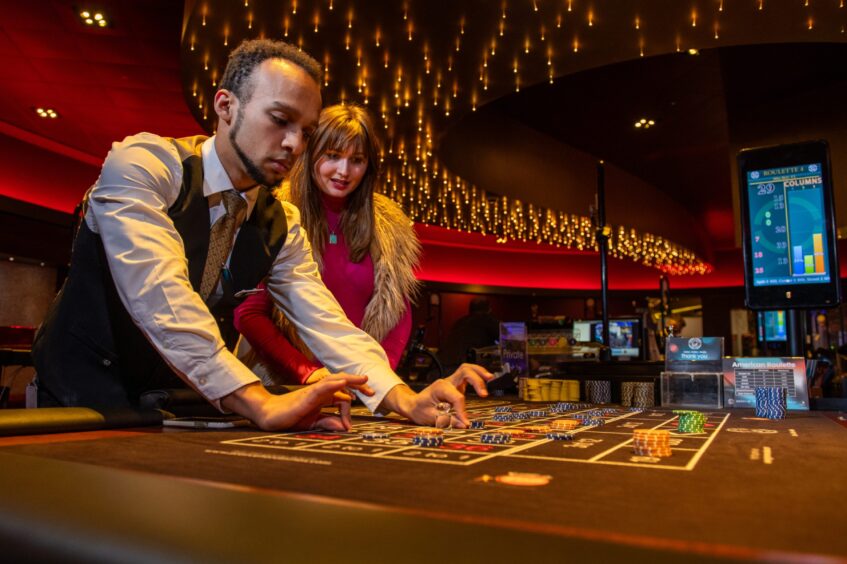

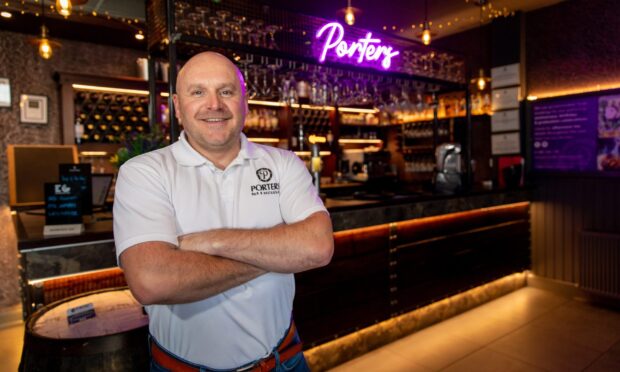
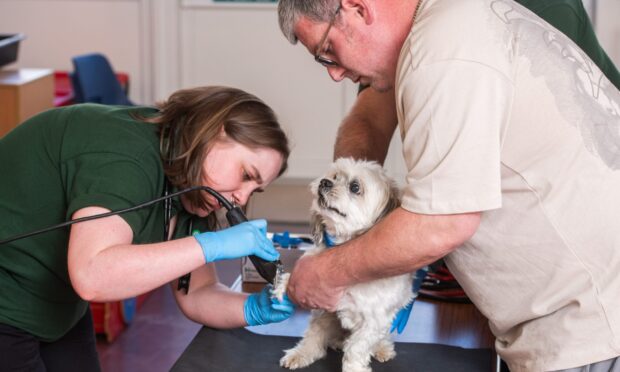




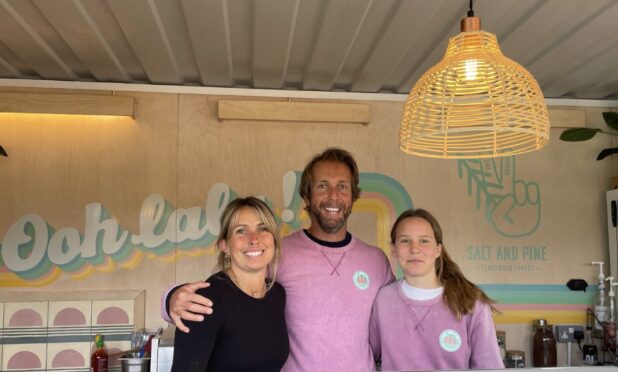


Conversation